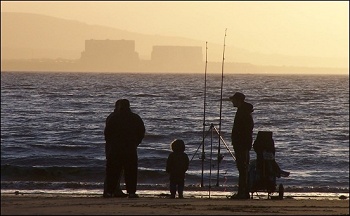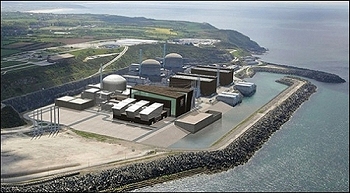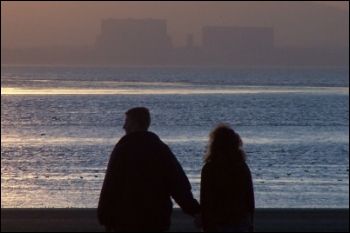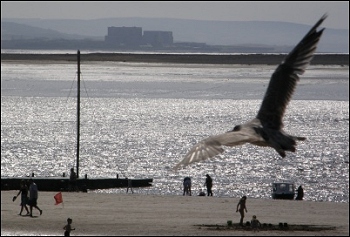Fresh fears about the health effects of Hinkley Point power station on people living in the Burnham-On-Sea area have been raised this week.
It follows the release of figures that suggest breast cancer diagnoses are 50 per cent above national figures in Burnham-On-Sea.
French energy giant EDF wants to build a new reactor at Hinkley Point but a study by Professor Chris Busby, of Green Audit, casts doubt over claims that the new reactor would have no ill-effects on those living in Burnham.
In response to the study, though, public health bosses have been quick to claim that there is still “no compelling evidence” of a link between Hinkley Point and statistical rates of cancer.
Professor Busby’s study centres on the electoral wards of Burnham-On-Sea north and south, where 54 extra cases above average were recorded between 1994 and 2004.
 The figures have been confirmed by Professor Derek Pheby, former director of the South-Western Regional Cancer Registry, and a member of the Medical Research Council.
The figures have been confirmed by Professor Derek Pheby, former director of the South-Western Regional Cancer Registry, and a member of the Medical Research Council.
Anti-nuclear pressure group Stop Hinkley argues this is enough evidence to state that a further power station should not be built.
But NHS Somerset spokesman Paul Courtney told Burnham-On-Sea.com on Thursday (October 21st): “Public Health Advisors with NHS Somerset note the comments and concerns being made by those opposed to the development of a new nuclear power station at Hinkley Point, however the Primary Care Trust has seen no new or compelling evidence to date which would support the campaigners’ hypothesis that radioactive pollution arising from the past operation or the recent decommissioning of Hinkley Point is responsible for a statistical increase in the incidence of breast or any other cancer in the surrounding area.”
“If campaigners do feel they have new information which might reasonably support such a causal link between environmental pollution and health then they are strongly advised to bring this to the direct attention of the respective statutory agencies charged with regulating nuclear industry and monitoring environmental pollution. Alternatively, they may bring this to the attention of their local MP or the Chief Medical Officer for England and Wales.”
 Stop Hinkley obtained the new figures following a House of Lords ruling that allowed ‘incidence’ or ‘diagnosis’ data to be made available. Previously, only ‘mortality’ data or death rates were available.
Stop Hinkley obtained the new figures following a House of Lords ruling that allowed ‘incidence’ or ‘diagnosis’ data to be made available. Previously, only ‘mortality’ data or death rates were available.
Stop Hinkley says incidence data is more helpful in linking environmental causes to health effects as bigger statistics are involved.
It applied to the South West Public Health Observatory to provide the figures under the Freedom of Information Act and commissioned Professor Busby to analyse them.
Between 1994 to 2004, 113 women would have been expected to contract breast cancer in the area, however Prof Busby found 167 women were diagnosed, 50 per cent higher than normal.
The random chance of this occurrence in the two electoral wards was one in two million – and Stop Hinkley says the study backs up several previous health studies.
 In a discussion with Professor Busby, health officials at the South West Public Health Observatory suggested that the whole region’s breast cancer rate is one quarter higher than the national average, reducing some of the claimed Burnham excess. But Prof Busby says the Office of National Statistics national and regional figures confirm the risk at Burnham.
In a discussion with Professor Busby, health officials at the South West Public Health Observatory suggested that the whole region’s breast cancer rate is one quarter higher than the national average, reducing some of the claimed Burnham excess. But Prof Busby says the Office of National Statistics national and regional figures confirm the risk at Burnham.
Professor Pheby has called on the Observatory and Professor Busby to collaborate on future studies.
Jim Duffy, Stop Hinkley coordinator, told Burnham-On-Sea.com: “For years, the nuclear industry and health officials have been smearing Professor Busby’s work. But luckily he hasn’t gone away and is now supported by an eminent professor. With confirmed breast cancer rates like this it would be inhuman to allow Hinkley C to go ahead with its massive outpourings of radio-isotopes.”
“If, as Professor Pheby suggests, the Government secretly accepts the truth of this cancer cluster and refuses to act because it wants nuclear power that would be heartlessly criminal and corrupt.”
“Over fifty Burnham families have needlessly lived with this killer disease in the last decade alone. Let’s stop the cause of it by snuffing out nuclear power at Hinkley Point.”







